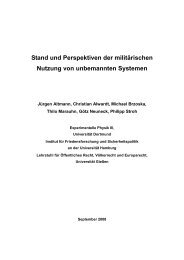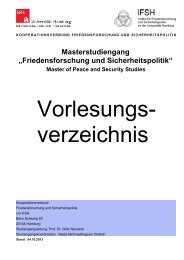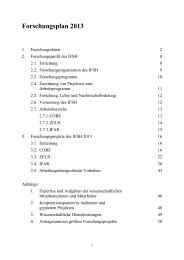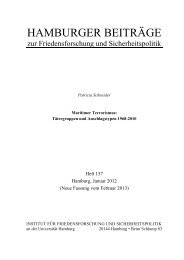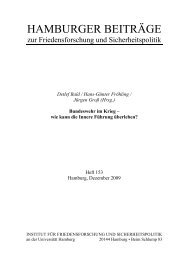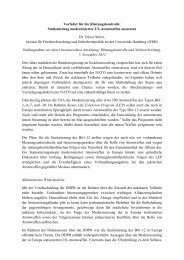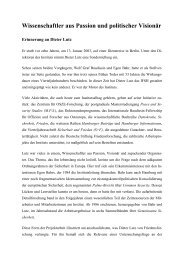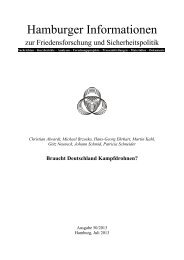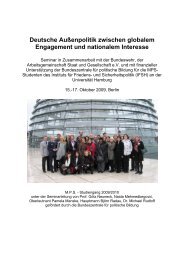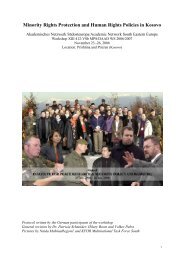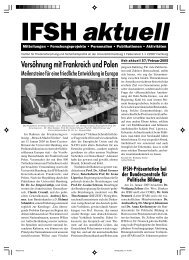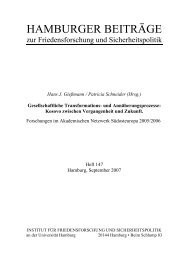New Challenges for the German Security Policy - IFSH
New Challenges for the German Security Policy - IFSH
New Challenges for the German Security Policy - IFSH
You also want an ePaper? Increase the reach of your titles
YUMPU automatically turns print PDFs into web optimized ePapers that Google loves.
NATO Headquarters, Brussels: „Evolution of NATO into <strong>the</strong> 21 st<br />
Century”<br />
Dr. Knut Kirste, <strong>German</strong> Info and Liaison Office, Public <strong>Policy</strong> Division.<br />
April 27, 2006<br />
The visit to <strong>the</strong> North Atlantic Treaty Organisation’s (NATO) Headquarters in Brussels, Belgium<br />
took place on <strong>the</strong> 27 th April 2006. First <strong>the</strong>me offered <strong>for</strong> discussion was <strong>the</strong> trans<strong>for</strong>mation of <strong>the</strong><br />
organisation beginning from <strong>the</strong> end of <strong>the</strong> Cold War till present time. Dr. Kirste divided his<br />
presentation into three parts: evolution, enlargement and <strong>the</strong> agenda of <strong>the</strong> NATO meeting in Sofia,<br />
Bulgaria.<br />
The first part touched upon <strong>the</strong> evolution of <strong>the</strong> Alliance. The changes within <strong>the</strong> organisation were<br />
needed to adopt NATO to <strong>the</strong> new challenges of <strong>the</strong> freedom and security in <strong>the</strong> world. From <strong>the</strong><br />
military defense organisation it now perceives itself as a collective security alliance; from a<br />
Eurocentric organization it became global, engaging in <strong>the</strong> field of cooperation, conflict prevention,<br />
stabilization and peace building. These all required changes in <strong>the</strong> strategy, technological<br />
improvements, intensive training of <strong>the</strong> soldiers not only in <strong>the</strong> spheres of military techniques, but<br />
also in peace building and peacekeeping.<br />
After <strong>the</strong> enlargement of <strong>the</strong> institution including 10 more member-states with 52 million people,<br />
<strong>the</strong> new frontiers were confronted with unstable neighborhood and <strong>for</strong>mer enemies. Ensuring <strong>the</strong><br />
security in <strong>the</strong> Atlantic region, NATO established <strong>the</strong> Partnership <strong>for</strong><br />
Peace Program with 20 countries from <strong>the</strong> Mediterranean and Eurasia.<br />
The possibility to discuss <strong>the</strong> issues of common interest in <strong>the</strong> Council<br />
and carry out joint military and peacekeeping operations raise <strong>the</strong><br />
awareness among partnership states about <strong>the</strong> NATO as an<br />
organisation and established an environment of mutual trust and<br />
cooperation. According to <strong>the</strong> speaker, such improvements untied<br />
NATO’s hands. It is now geographically unrestricted. Action can<br />
ra<strong>the</strong>r be taken wherever and whenever needed. At <strong>the</strong> same time,<br />
NATO’s global participation on territories like Afghanistan, and<br />
cooperation with countries like Australia, both lying far beyond <strong>the</strong><br />
North-Atlantic region, produce political disputes on how far <strong>the</strong><br />
organisation will enlarge, while risking to lose its natural roots as <strong>the</strong><br />
North-Atlantic Alliance.<br />
All <strong>the</strong>se issues were intensively discussed by <strong>the</strong> 26 NATO Foreign Ministers on <strong>the</strong> meeting in<br />
Sofia, Bulgaria on 27 th April 2006. The core topic on agenda, as Dr. Kirste pointed out, concerned<br />
<strong>the</strong> streng<strong>the</strong>ning of <strong>the</strong> NATO relations with non-member states, such as Japan, South Korea, <strong>New</strong><br />
Zealand and Australia. Also <strong>the</strong> NATO’s Training Initiative toge<strong>the</strong>r with capacity-building in <strong>the</strong><br />
frames of enlargement to Africa and Middle East were as well <strong>the</strong> focus of vigorous debate.<br />
Teodora Vrancean, Nodira Inoyatova, Frank Reininghaus<br />
NATO Headquarters, Brussels: Relationships between NATO and <strong>the</strong><br />
Broader Middle East<br />
Mr. Alberto Bin, NATO Political Affairs Division & Multilateral & Regional Affairs Section<br />
Mr. Alberto Bin gave a short introduction into <strong>the</strong> relationship between NATO and <strong>the</strong> Broader<br />
Middle East, be<strong>for</strong>e answering students´ questions.<br />
Starting in 1994, <strong>the</strong> NATO regarded <strong>the</strong> Sou<strong>the</strong>rn Mediterranean Rim as an area of potential<br />
instability; <strong>the</strong>re<strong>for</strong>e two instruments were introduced to countries in that area, <strong>the</strong> Mediterranean<br />
Dialogue (MD) and <strong>the</strong> Istanbul Cooperation Initiative (ICI). These two were aiming at two<br />
separate groups of countries, and both contained a different approach from <strong>the</strong> EU approach<br />
13



